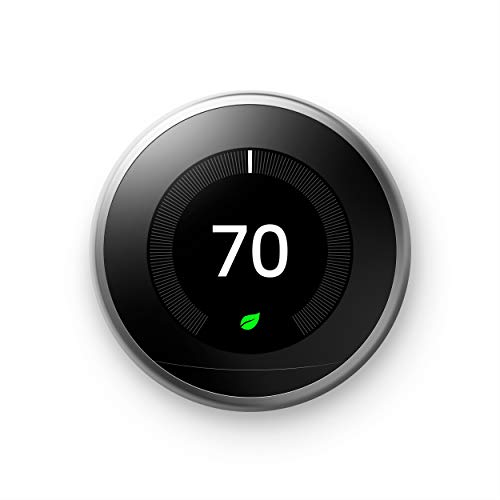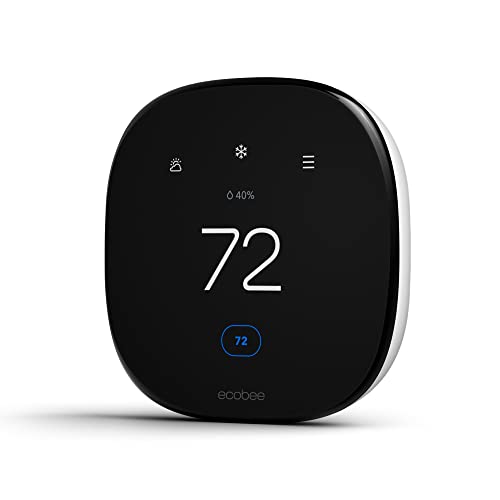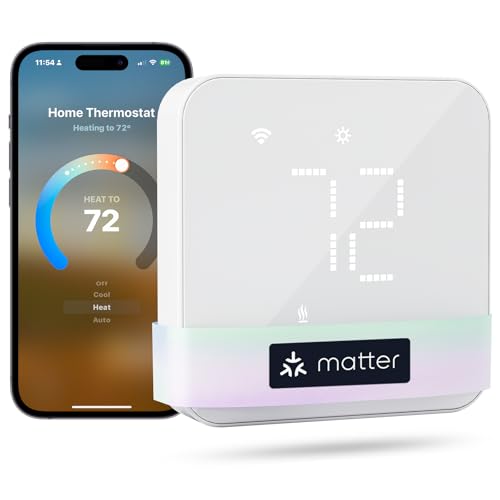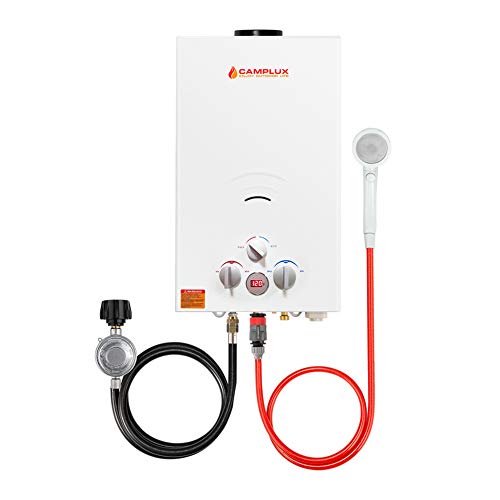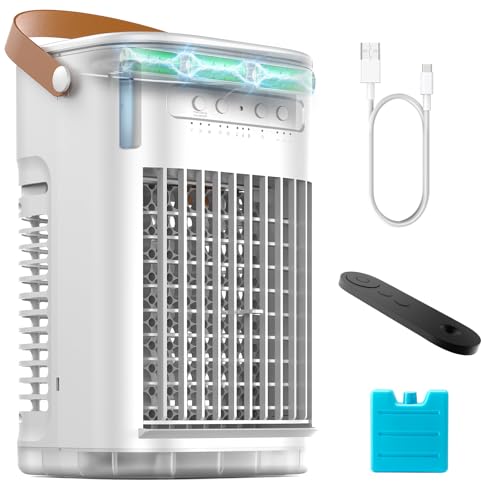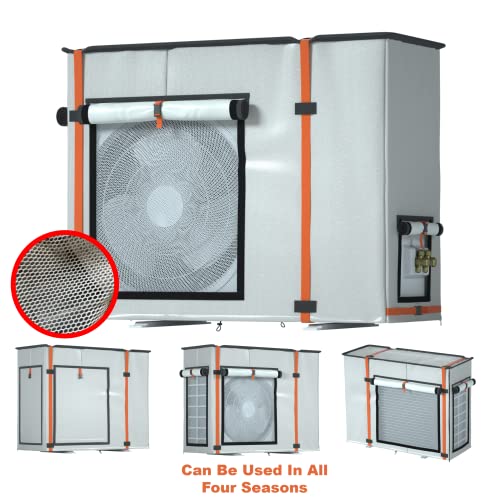Top 10 Best Home Smart Thermostats in 2026: Reviews
Abolarin Samuel Mar 1, 2026 3:43 AM
Introducing the future of home comfort and energy efficiency - the best home smart thermostats. With cutting-edge technology and intuitive features, these smart devices are revolutionizing the way we control and optimize our home environments. In this blog, we will dive into the world of smart thermostats, exploring the top 10 contenders in 2025 and providing detailed reviews that will help you make an informed decision. Whether you're a tech enthusiast, an energy-conscious homeowner, or simply seeking convenience, join us as we explore the best home smart thermostats that are shaping the way we live and interact with our homes.
Top Picks
Source: Amazon
Best Home Monitoring: New ecobee Smart Thermostat Premium with Smart Sensor
Pros
-
Energy Savings
-
Air Quality Monitoring
-
Smart Home Integration
-
Advanced Occupancy Sensing
Cons
-
Requires Security Subscription for Full Features
The ecobee Smart Thermostat Premium stands out as a sophisticated device that goes beyond traditional temperature control by integrating home monitoring features. It offers significant energy savings by optimizing heating and cooling with its included SmartSensor, which targets the most used rooms to maintain comfort and reduce costs. Its built-in air quality monitor provides real-time alerts and maintenance reminders, enhancing indoor health. The large, vibrant display combined with voice control through Alexa or Siri delivers a seamless user experience. Additionally, it functions as a security hub, alerting users to smoke, potential break-ins, and open doors or windows, though some of these advanced features require a subscription to ecobee’s Smart Security plan. Installation is straightforward with compatibility across most HVAC systems, including a Power Extender Kit for homes without a C-wire.
Users appreciate the energy savings and the convenience of controlling their thermostat via voice commands and the app. Many highlight the effectiveness of the SmartSensor in balancing temperatures throughout the home. Some note that the need for a separate subscription to unlock security alerts can be a drawback, but overall, the combination of comfort, energy efficiency, and home monitoring earns positive feedback for those seeking a comprehensive smart thermostat solution.
Best Self-Learning: Google Nest Learning Thermostat - Programmable Smart Thermostat
Pros
-
Auto-Schedule Learning
-
Home/Away Assist
-
Remote Control via App
-
Energy Usage Tracking
Cons
-
Limited Compatibility Check Needed
The Google Nest Learning Thermostat offers a highly intuitive experience by automatically learning your temperature preferences and creating a personalized schedule without manual programming. It optimizes energy use by adjusting settings when the home is empty through Home/Away Assist, helping to reduce unnecessary heating or cooling. Users can conveniently control the thermostat from anywhere using the Nest app, making remote adjustments simple. The device also tracks energy consumption and provides insights to help users save more. The distinctive Nest Leaf icon guides users toward energy-efficient settings. Compatibility with HVAC systems requires verification through Google’s online checker, which can be a slight hurdle before purchase.
Users frequently praise the Nest for its ease of use and the effectiveness of its learning capability. The remote access feature is valued for convenience, and the energy reports offer useful feedback for reducing bills. Some mention the need to confirm system compatibility beforehand, but overall, the thermostat is seen as a smart, user-friendly solution that balances comfort and efficiency well.
Best Humidity Control: New ecobee Smart Thermostat Enhanced
Pros
-
Automatic Away Adjustment
-
Preheat/Precool Feature
-
Humidity-Based Temperature Control
-
Hardwired for Reliability
Cons
-
Requires Wired Installation
The ecobee Smart Thermostat Enhanced delivers a reliable and efficient climate control experience with its ability to automatically adjust temperature based on occupancy and humidity levels. It saves energy by reducing heating or cooling when no one is home and ensures comfort by preheating or precooling before arrival. The thermostat’s hardwired design eliminates battery concerns, providing consistent performance. Users can easily manage settings via the ecobee app or smart home platforms such as Alexa, Google Assistant, and Apple HomeKit. Compatibility with most 24 VAC HVAC systems is broad, and the included Power Extender Kit simplifies installation in homes lacking a C-wire. Adding a SmartSensor helps optimize temperature in key rooms.
Customers value the consistent comfort and energy savings this model offers, especially appreciating the humidity adjustment feature that maintains a more natural feel indoors. The hardwired setup is praised for stability but can be a downside for those seeking a wireless option. Overall, it is favored for ease of use, integration, and dependable performance.
Best Multi-Room Comfort: Honeywell Home RCHT9510WF T9 Wi-Fi Smart Thermostat
Pros
-
Smart Room Sensors
-
Auto Home/Away Scheduling
-
Wide Sensor Range
-
Energy Usage Reports
Cons
-
Battery Dependency for Sensors
The Honeywell Home RCHT9510WF T9 Smart Thermostat excels at delivering targeted comfort through its included Smart Room Sensors, allowing temperature control tailored to specific rooms. These sensors use advanced technology to communicate effectively across large distances within the home, providing multi-room focus without compromise. The thermostat supports multiple smart home platforms including Alexa, Google Assistant, and Apple HomeKit, enabling flexible control. Its Auto Home/Away scheduling helps conserve energy by adjusting settings based on occupancy patterns, while monthly energy reports offer insights for further savings. The device is ENERGY STAR certified, emphasizing its efficiency credentials.
Users appreciate the ability to control comfort room by room, which contributes to better sleep and overall home environment. The sensors’ battery power offers flexibility but requires occasional maintenance, which some find inconvenient. Overall, the T9 is favored for its intelligent multi-room management and energy-saving features, making it suitable for homeowners seeking precise and efficient climate control.
Best DIY Installation: Sensi Touch Smart Thermostat by Emerson
Pros
-
Easy DIY Setup
-
Energy Savings
-
Wide Smart Home Compatibility
-
Maintenance Alerts
Cons
-
Requires C-Wire for Installation
The Emerson Touch Wi-Fi Thermostat offers a user-friendly solution for homeowners seeking simple installation and effective energy management. Its intuitive app guides users step-by-step through setup, complemented by built-in features like an illuminated terminal and level to facilitate a quick DIY process. Certified by ENERGY STAR, the thermostat can reduce HVAC energy use by approximately 23% through flexible scheduling and remote control via the Sensi app. The sleek color display enhances usability, while broad compatibility with Alexa, Google Assistant, Apple HomeKit, SmartThings, and Vera ensures seamless integration into various smart home ecosystems. Additionally, it supports smart maintenance by providing system performance reports and filter change reminders.
Users highlight the ease of installation as a major advantage, especially for those comfortable with DIY projects. The energy savings and remote access features receive positive feedback for convenience and cost efficiency. However, the requirement of a C-wire may limit compatibility in some older homes. Overall, the Emerson Sensi is favored for its combination of simplicity, smart features, and reliable performance.
- 9.4
- BrandHoneywell Home
- 9.3
- BrandEmerson
- Prime
- 9.1
- BrandHoneywell Home
- 9.0
- Brandecobee
- 8.8
- BrandGoogle
- Prime
- 8.4
- BrandEmerson Thermostats
- Prime
- 8.3
- Brandmeross
Last update on 2026-03-01 / Affiliate links / Images, Product Titles, and Product Highlights from Amazon Product Advertising API
What is the best thermostat to use in a house?
The best thermostat to use in a house depends on various factors such as personal preferences, budget, and the heating/cooling system in place. However, some popular and highly recommended options include the Nest Learning Thermostat, the ecobee SmartThermostat, and the Honeywell Home T9 Smart Thermostat. These thermostats offer advanced features like learning capabilities, remote access through smartphone apps, and compatibility with smart home systems. It is recommended to research and compare different models to find the one that best suits your needs.
Is it worth buying a smart thermostat?
Yes, it is worth buying a smart thermostat. Smart thermostats offer several benefits that can enhance both your comfort and energy efficiency. Firstly, smart thermostats allow you to control and adjust your home's temperature remotely through smartphone apps, giving you the convenience of managing your thermostat from anywhere. This means you can ensure your home is at a comfortable temperature when you arrive or adjust it if your plans change.
Additionally, smart thermostats often come with advanced features like learning capabilities. These thermostats can analyze your heating and cooling patterns and adjust settings accordingly, optimizing energy usage and potentially saving you money on your utility bills.
Furthermore, smart thermostats can integrate with other smart home devices, such as voice assistants or smart speakers, allowing for seamless automation. You can set up personalized routines and schedules to automatically adjust the temperature based on your preferences or even the weather outside.
Moreover, many smart thermostats provide detailed energy usage reports and insights, helping you identify energy-saving opportunities and make more informed decisions about your consumption habits.
Lastly, investing in a smart thermostat is also an environmentally conscious choice. By optimizing your energy usage and reducing unnecessary heating or cooling, you can contribute to reducing greenhouse gas emissions and minimizing your carbon footprint.
What is the disadvantage of a smart thermostat?
One disadvantage of a smart thermostat is the potential for increased energy consumption. While smart thermostats are designed to optimize energy usage and reduce costs, they rely on internet connectivity and complex algorithms to learn and adjust to your preferences. If there are connectivity issues or if the smart thermostat malfunctions, it may lead to inaccurate temperature readings or incorrect adjustments, resulting in unnecessary heating or cooling. This can potentially increase energy consumption and utility bills. Additionally, some smart thermostats require a constant power source, which means they may contribute to energy usage even when not in use.
How do I choose a good smart thermostat?
When choosing a smart thermostat, there are several factors to consider in order to ensure you select a good one:
1. Compatibility: Check if the smart thermostat is compatible with your heating and cooling system. Some thermostats only work with specific systems, so it's important to make sure they will work with yours.
2. Features: Look for features that align with your needs and preferences. Common features include scheduling, remote access, energy usage reports, and voice control. Consider what features are important to you and choose a thermostat that offers them.
3. User Interface: Consider the user interface of the smart thermostat. It should be intuitive and easy to use. Look for a thermostat with a clear display and simple navigation menus.
4. Integration: If you have other smart home devices, check if the thermostat can integrate with them. Compatibility with platforms such as Amazon Alexa, Google Assistant, or Apple HomeKit allows for seamless control and automation.
5. Energy Savings: Look for a smart thermostat that has energy-saving features like adaptive learning or occupancy sensors. These features can help optimize your heating and cooling settings, leading to potential energy savings and lower utility bills.
6. Brand Reputation: Research the reputation of the brand and read customer reviews to get an idea of the reliability and performance of the smart thermostat you are considering. A reputable brand with positive reviews is more likely to offer a quality product.
7. Installation: Consider the installation process. Some smart thermostats require professional installation, while others can be easily installed by homeowners. Make sure you are comfortable with the installation requirements before making a purchase.
Read More:
The Best Smart Thermostat of 2026 I SHR
The Best Smart Thermostat No C Wire - Reviews & Buyers Guide
The Best Smart Thermostat Homekit: Reviews & Buyers Guide
The 10 Best Smart Thermostat For Vacation Rental Review For 2026
The Best Digital Room Thermostat: Reviews & Buyers Guide
Choosing the best home smart thermostats ultimately depends on your specific needs, preferences, and budget. These devices offer significant advantages in energy efficiency, convenience, and comfort by allowing precise temperature control and remote access. Whether you prioritize compatibility with voice assistants, advanced scheduling features, or user-friendly interfaces, the models reviewed here represent top-tier options in the smart thermostat market. Investing in a reliable smart thermostat not only enhances your home’s climate management but can also lead to noticeable savings on energy bills over time. Careful consideration of features and integration capabilities will help you select a thermostat that delivers lasting value and improves your everyday living experience.



